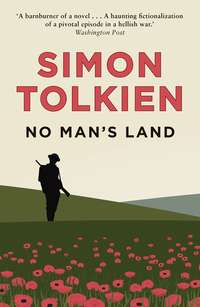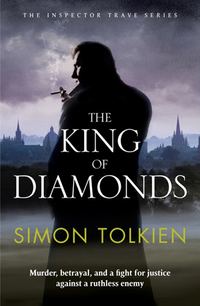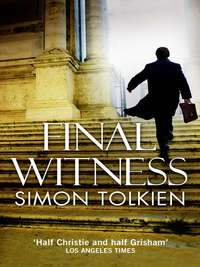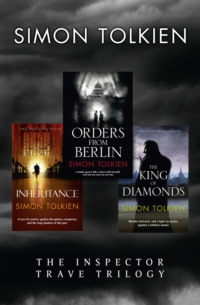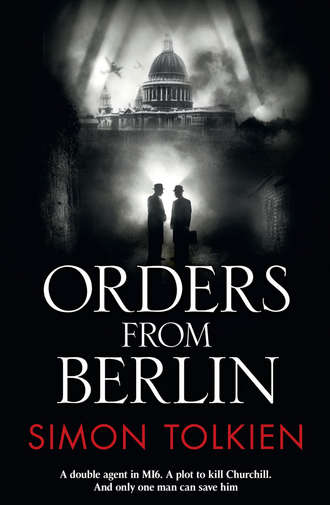
Полная версия
Orders from Berlin
‘If we can’t control the skies, we can’t control the sea. An invasion is a waste of time. Any fool knows that. And so I’m to wait here doing nothing, listening to you telling me about incendiary bombs while Stalin builds more tanks. The Bolsheviks are the enemy, not the British. That is where the panzers must go, that is our destiny,’ Hitler shouted, jamming his finger down on the right side of the map, into the huge red mass of the Soviet Union. ‘I always knew this. I wrote it in my book fifteen years ago. Perhaps you should read it again, Herr Reichsmarschall – refresh your memory. My Struggle, I called it; Mein Kampf. I should have called it My Struggle to Be Heard.’
‘We will win,’ said Goering, injecting a note of certainty into his voice that Heydrich was sure he didn’t feel. ‘Just a little more time is all we need. And the RAF will be finished. They cannot withstand us; they are on their last legs.’
‘They are bombing Germany!’ Hitler screamed. ‘That is what they are doing. And you talk like it isn’t happening.’
Hitler took out his handkerchief and mopped his sweating brow. He held hard on to the side of the table, trying to control his breathing.
‘The invasion of England is cancelled, indefinitely postponed – call it what you like. You have all failed,’ he said, looking slowly around at his generals as if he were registering each face for subsequent review. ‘All of you,’ he repeated. His voice was soft but venomous, and the men closest to him instinctively took a step back. ‘Let it be the last time.’
Abruptly he turned and walked away from the table towards the side door by which he had come in. The conference was over.
Ten minutes later, Heydrich stood at the top of the entrance steps, watching the leaders of the Third Reich leave the Berghof one by one in their chauffeur-driven black Mercedes-Benz staff cars. In just the last few days summer had turned to autumn, and the canvas umbrellas over the outdoor tables flapped disconsolately in the light breeze that was blowing up from the valley below. It seemed to Heydrich far longer than a week since he had sat with Hitler on the stone terrace, drinking tea in the afternoon sunshine.
Looking down the steps, Heydrich remembered the Führer standing where he was now, waiting to greet the straight-backed British Prime Minister Neville Chamberlain in the week before the Munich Conference in 1938. Chamberlain had watery eyes and a wispy moustache, and he’d wanted peace in our time. Heydrich remembered afterwards the way Hitler had scornfully described how the Englishman’s hands had trembled when he used the word war. And Chamberlain hadn’t been alone. Lord Halifax, England’s foreign minister then and now, had also wanted to find a peaceful solution to ‘Germany’s legitimate demands’, as he’d called them. Hitler was right – it was Churchill who had changed the rules of the game. The fat man was in love with the sound of his own voice, filling the radio waves with his hatred of Germany and his talk of blood, toil, sweat, and tears. The false briefing paper exaggerating Germany’s preparedness for the invasion of England on which Heydrich had lavished so much time and care had made no difference. D had reported that Churchill wouldn’t back down – the old fool had meant exactly what he’d said in his rabble-rousing speech to the British Parliament back in June: ‘We shall fight on the beaches, we shall fight on the landing grounds, we shall never surrender.’ Fine words, but meaningless when the British Army had left all its heavy weapons on the beach at Dunkirk and their Home Guard was armed with spades and pitchforks. Without Churchill things might be different: sense might prevail. And D’s radio message had contained an idea for how Churchill might be removed from the equation – only a possibility, but certainly one worth exploring. A new door seemed to be opening just as an old one was closing.
Heydrich hadn’t mentioned D’s idea in the report that he’d sent to Hitler by courier the day before. It required a face-to-face conversation; it was too sensitive to be put in writing, and besides, Heydrich wanted to ensure it remained a secret between him and the Führer. He hesitated as he slowly buttoned his greatcoat and adjusted the peak of his SS cap over his brow. On the face of it, now was a perfect opportunity to see the Führer alone. He’d watched all the generals leave. But Hitler might not be receptive to new ideas in his present angry mood – an unscheduled intrusion might only infuriate him more. Yet Heydrich had a solution to offer to the very problem that was causing the Führer’s ill humour.
He ran the tip of his tongue round the edges of his lips as he weighed the odds, and then, making up his mind, he turned on his heel and re-entered the house. The great hall was empty, so he went on into the pine-panelled dining room and practically collided with the Führer’s valet, Heinz Linge.
‘Please tell the Führer that I wish to see him,’ said Heydrich. He was nervous and made it sound like an order rather than a request.
‘But the Führer is resting, Herr General,’ said Linge, who was under instructions to take orders from no one except his master. ‘The conference has ended. Everyone has left.’
‘Tell the Führer that that is why I am here,’ said Heydrich, standing his ground. ‘Because of what was discussed at the conference. I have something important to tell him. I need to see him urgently.’
‘Something that can’t wait. But something that couldn’t be said before in front of your colleagues. You intrigue me, Reinhard.’ Hitler had appeared silently behind his valet in the doorway, standing with his hands behind his back, but Heydrich was reassured to see that the Führer was smiling and appeared to have entirely shaken off his earlier irritation. He’d changed into a simple white military jacket, the same colour as Goering’s but otherwise entirely unlike the Reichsmarschall’s ridiculously flamboyant uniform.
‘Come, let us go out,’ he said. ‘We can walk together and enjoy the view down over the valley, and you can tell me what it is that is so urgent.’
They set off, walking side by side along the wooded path that led from the Berghof to Hitler’s teahouse on the Mooslahnerkopf hill, with the Führer’s Alsatian dog bounding along in front of them. Heydrich knew that this was one of Hitler’s favourite walks – he went to the teahouse almost every day when he was at the Berghof, and Heydrich had accompanied him there on several occasions, but never alone like now. It felt awkward to be walking casually with the supreme leader, and Heydrich watched his pace and walked with a slight stoop to ensure that Hitler wasn’t aware of his height advantage.
There was a cold grip in the air, but no clouds in the pale blue sky. To their right, the trees were laden with golden leaves turning to red before they fell, and to their left the spires and roofs of the small resort town of Berchtesgaden were clearly visible spread out across the valley floor three thousand feet below. All around, the mountains of the Bavarian Alps towered above their heads. Heydrich instinctively understood why Hitler loved this place and had chosen to make it his home. They were in the very heart of the Reich. There was an elemental energy in the air, in the vista, that reminded Heydrich of Caspar Friedrich’s painting, The Wanderer Above the Sea of Mists. Heydrich liked beauty – he could create it himself at home in the evenings when he stood at the window of his study with his violin, playing the Haydn sonatas that he’d learnt from his father when he was a boy. He understood it just as he understood the web of complex emotions that motivated the actions of his fellow human beings; but his understanding was clinical, an entirely cerebral analysis. Heydrich had no capacity for empathy whatsoever and, like his leader, he stood apart, utterly unmoved by the suffering of others. All that mattered to him was the use and pursuit of power.
They walked in silence, with Heydrich waiting for Hitler to open the conversation. The wind had died down and their footsteps on the hard ground were the only sound, apart from the tap of Hitler’s walking stick. The dog had gone on ahead. Soon they reached the point where the path bent out from under the trees, providing a panoramic viewing point. Hitler sat on the wooden bench looking out over the railings, and Heydrich followed suit.
‘I never get tired of this place,’ Hitler said meditatively. ‘I have tried to paint it several times from different angles, but it is too vast, too much a theatre in the round for me to capture on a canvas. Its essence escapes me.’
‘They say that Charlemagne sleeps under that mountain,’ said Heydrich, pointing across the valley to the majestic Untersberg, which reared up to a distant snow-capped peak thousands of feet above them, barring the way into Austria.
‘And they say that Jesus is the son of God,’ said Hitler tartly. ‘Why do you talk to me of Charlemagne? He’s been dead a thousand years.’
The riposte was typical of the Führer – always challenging those he was with, refusing to relax. But Heydrich was ready with his answer.
‘Because he did what you did,’ he said. ‘Charlemagne united the Volk; he made a Reich just like you have done. He had the will and the vision and the power to accomplish his mission. Men like you come rarely. They can change history, but there are always spoilers like Churchill who stand in their way, trying to destroy their work.’
‘And without Churchill the British would make peace. Is that what you are trying to say?’
‘Yes.’
‘Well, you are probably right,’ said Hitler, nodding. ‘This war makes no sense for them and none for us. It’s like I have always said – I am England’s friend. There is room for them in the world and room for us too. We are all Aryans. But Churchill will not listen. He is the Bolsheviks’ greatest ally. I am sure Stalin has a picture of fat Winston in his bedroom in Moscow and that he kisses it with his filthy icons at night.’ Hitler’s sudden harsh laughter cut the air before he abruptly resumed the quiet, serious voice with which he had been speaking before. ‘What is it you are trying to tell me, Reinhard?’ he asked. ‘Don’t talk in riddles.’
Heydrich took a deep breath of the cold mountain air. He felt his heart beating hard under his uniform and a sense of vertigo rising through his body that didn’t come from their elevated position. He knew instinctively that this was his opportunity. With the credit for Churchill’s assassination, he could be Hitler’s deputy. With England out of the war, he would have succeeded where Goering and the generals and admirals had failed.
‘I think I can solve the problem,’ he said quietly. ‘I think I can remove Churchill from the equation.’
‘Kill him, you mean? How are you going to do that?’
‘As you know, I received a radio message from our agent yesterday. What I didn’t mention in my report is that he saw Churchill in person, and he seems to think that if he’s summoned to see Churchill again, then there might be an opportunity. I don’t know the details, obviously – it was a very short message.’
‘Well, get the details.’ Hitler snapped out the order. He got up from the bench, smoothing the crease of his black trousers into place, and walked over to the railings, standing with his back to Heydrich and looking out towards the mountains, drumming his fingers on the wood.
After a moment, he turned around. ‘We must not get ahead of ourselves,’ he said slowly. ‘I need to know whether this is a harebrained scheme or a real chance to eliminate Churchill once and for all. We don’t want to throw away our best intelligence asset on a thousand-to-one bet. But if it can be done, then let it be done.’ Hitler rubbed his hands together, a characteristic gesture when he was excited. He smiled, exposing his teeth, and his blue eyes glowed. ‘This is the best idea I have heard in a long time. The worms will have a feast when Churchill’s fat body goes underground. But you must be quick in finding out what is possible, you understand? East is where we must go. And before next year is too far advanced; before Stalin is ready for us. We must give our troops enough time – I have no intention to be another Napoleon, freezing to death in the Moscow cold.’
‘You can count on me,’ said Heydrich, getting up from his seat and standing to attention opposite Hitler, the image of a loyal soldier.
‘I hope so,’ said Hitler, looking searchingly at his subordinate. ‘We are playing for high stakes. Do not let me down, Reinhard.’
Hitler whistled and the dog came running up through the trees. ‘We will go back now,’ he said, turning towards the Berghof. ‘You have work to do. But next time you come, we will walk all the way to my teahouse. The view from the Mooslahnerkopf is excellent, even better than from here. And you can tell me more about this opportunity.’ Hitler smiled as he repeated Heydrich’s word. ‘I shall look forward to it.’
There was a spring in Hitler’s step now as he walked, and he hummed a tune under his breath. They rounded a corner and, looking up, Heydrich caught sight of the Eagle’s Nest, the retreat built for the Führer by the party faithful on a ridge at the top of the Kehlstein Mountain, three thousand feet above the Berghof. Thirty million Reichsmarks, five tunnels, and an elevator – an engineering miracle – yet Hitler hardly ever went there, preferring his small teahouse on the Mooslahnerkopf Hill. Heydrich smiled, thinking of the wasted effort. Results were what mattered; they were what led to advancement up the ladder of power. And now finally he believed he held the keys to the citadel dangling in his hand.
They parted in the hall. The map had been cleared away and the oak table moved back against the wall. It was as if the conference had never happened. Heydrich raised his arm in salute and felt Hitler’s pale blue eyes fixed upon him again, boring into his soul, before the Führer turned and walked away, releasing him back into the world.
IV
They sat restlessly around the long table arranged in a kind of hierarchical order, with the least powerful among them exposed to the wintry draught by the door and the most important positioned closest to C’s empty chair and the fire behind it, which had died down to a black, smoky residue of itself in the last half-hour. There was no coal left in the scuttle, and nobody had volunteered to descend the seven flights of stairs to fetch more from the store in the basement.
It was ten in the morning outside, but inside it might as well have been the dead of night. The thick blackout curtains were kept permanently in place in Con 1, as this room was known – God knows why, as there were no other conference rooms in the building – and the only illumination came from two milky-white electric globes hanging by rusty metal chains from the ceiling overhead. Up until yesterday there had been three of these lights, but the one nearest the door had given up the ghost during the previous night’s air raid and Jarvis, the caretaker, had not yet got round to replacing it.
Far too busy ministering to C’s ceaseless stream of demands, thought Seaforth with wry amusement. By long-hallowed custom, the head of MI6 was always known by the single letter C – short for chief, Seaforth supposed. And even though he hadn’t been in the job that long, this C was already notorious for his enjoyment of life’s luxuries: the best Havana cigars; malt whisky brewed in freezing conditions on faraway Hebridean atolls; pretty girls in the bar at the Savoy. Not that Jarvis was likely to be providing them, thought Seaforth, glancing across at the bent, skeletal figure of the caretaker standing over by the half-open door.
Jarvis was clad as always in the same grey overall that reached down to just below his arthritic knees. Seaforth had never seen him wearing anything else – the old man would have seemed naked in a suit and tie. Service rumour had it that Jarvis had fought as a non-commissioned officer in the Boer War and killed five of the enemy with his bare hands during the relief of Mafeking, but Seaforth had no way of knowing if this was true, as Jarvis made a point of never discussing his personal history. He’d been at HQ longer than any of the current occupants or indeed most of their predecessors and had over the years become a fixture of the place, like the soot-stained walls and the ubiquitous smell of cheap disinfectant.
Seaforth had only recently been permitted to join these meetings of the top brass, and he knew that if Thorn had had his way, he would still be sitting marooned in his tiny windowless office at the back of the building. But C had overruled Seaforth’s boss in this as in numerous other matters, and now Seaforth sat two chairs up from the door, three chairs away from Thorn, and four away from C’s empty seat, savouring his position as an up-and-coming man.
With a sigh of contentment, he ran his hands slowly through the mane of his thick, dark hair and stretched out his long, athletic legs under the table, rocking slowly back on his straight-backed chair, expertly keeping his balance. Like everyone else in the room, he was working harder than ever, existing on small amounts of sleep snatched between air raids; but unlike them, he managed somehow to look healthy and rested, his good looks enhanced if anything by the faint thin lines that had recently begun to crease his brow.
The only blemish on his day so far was the cigarette smoke. It hung in a thick, blue-grey cloud in the unventilated room, blending with the fumes from the dying fire, and clung to Seaforth’s suit, making his eyes water. He hated cigarettes – the poor man’s narcotic. They reminded him of home, of labourers coughing in the gloomy public houses after work, drowning their sorrows in watered-down beer. He looked round the room at his fellow spies sucking greedily on their John Player’s Navy Cut and Senior Service and did his best to conceal his disgust. C’s cigars were different – a symbol of his power, like the thick Turkish carpet that began at the threshold of his office in the next-door building or the slow, careful way in which he spoke, the perfectly rounded vowels enunciated in his aristocratic, Eton-educated voice. C was old school, but old school with a new broom, ready to give the young generation its head. Not like Thorn with his Oxford University tie and his visceral suspicion of anyone who hadn’t been to a public school. As far as Seaforth was concerned, the last war had been about sweeping away men like Thorn, but so far, at least, Thorn didn’t seem to have got the message.
To hell with Thorn, Seaforth thought. Unlike Thorn, he was here on merit – because he’d been able to produce intelligence out of Germany that the rest of the pathetic pen pushers in this room could only dream of, and his recent summons to Churchill’s bunker had sealed his advancement to the top table. And there wasn’t one damned thing that Thorn could do about it. Seaforth grinned, thinking of the way Thorn hadn’t said one word to him on the walk back through St James’s Park, just stared down at his feet as if he were thinking of putting an end to it all – which would be no loss to the Secret Service, Seaforth thought. Alec Thorn had become an encumbrance that MI6 could most certainly do without.
Over by the door, Jarvis cleared his throat. ‘’E’s coming,’ he announced in a thin, wheezing voice, and seconds later C entered the room, dressed in a green tweed suit and a red bow tie. He was a tall, impressive figure, possessed of a natural authority and an air of resolution intensified by the piercing blue of his eyes. They were a tool that C knew how to use to his advantage. ‘Look a man in the eye, and if he shrinks, then ten to one he’s a bounder,’ was one of the chief’s favourite adages.
C was nearly five years Thorn’s senior, but looking at the two of them, chief and deputy chief, sitting side by side at the end of the table, Seaforth thought that Thorn looked far and away the older man. He was careworn, with worry lines etched deep into his wide forehead and thinning grey hair receding from a rapidly spreading tonsure on his crown. And he sat bent over in his chair, alternately turning his filterless cigarette over in his fingers and then tapping its fiery end against the overflowing ashtray in front of him. His suit was worn and the edges of his shirt collar were frayed. Everything about him contrasted with the dapper, handsome figure of C on his left. It wasn’t hard to see why Whitehall had picked C for the job when the old chief had been given his marching orders three years before.
‘All present and correct,’ said C, glancing affably round the table. ‘Now we can’t be too long today, I’m afraid. I’ve got to be at the Admiralty by twelve for one of their invasion conclaves. I assume everyone’s seen young Seaforth’s latest intelligence report about the German plans – the one that was circulated three days ago?’ he asked, waving a piece of densely typewritten paper with ‘Top Secret’ stamped across the top. ‘Good. Well, it’s pure gold as usual. Winston’s delighted with the quality of the intelligence, apparently, although not so happy with what the Nazis have got pointed at us across the Channel. Did he say anything about the situation when you saw him, anything you can share with us?’ he asked, turning to his deputy.
Everyone else had their attention fixed on Thorn too. The whole country was jittery about the threat of the invasion, and the people in the room had access to privileged information about how real the threat actually was. A week earlier, GHQ had sent out the code word ‘Cromwell,’ meaning ‘invasion imminent,’ to all southern and eastern commands. Church bells had been rung – the agreed signal for an invasion – and widespread panic had ensued.
‘The PM doesn’t see how they can invade without air supremacy, and they’re a long way from having that,’ said Thorn. ‘He says we’re going to fight to the death even if they do come, but we already know that. Still, it was inspiring to hear it from him first-hand.’
‘I’m sure it was. Must have been an experience for you too, young Seaforth. Not every day an officer of your rank gets summoned to an audience with the Pope. But, as we all know, the PM likes to get his information first-hand and you’re the one providing it this time, so full credit to you,’ said C, lightly clapping his hands for a moment. Everyone joined in except Thorn, who looked stonily ahead, keeping his eyes fixed on a photograph of Neville Chamberlain on the opposite wall that no one had got round to replacing since Chamberlain had resigned the premiership back in May after the Norwegian disaster.
‘And what we need now is more of the same,’ C went on. ‘All the powers that be want from us is news of when the bastards are coming and what they’re bringing with them, and Seaforth’s man is giving us exactly that – and on a regular basis.’
‘Yes, pretty convenient, isn’t it?’ Thorn said softly.
‘What, you don’t trust the source, Alec?’ C asked sharply, turning to his deputy. ‘Well, he’s been right every time up until now, you know – about the build-up of the expeditionary force, about troop movements, about bombing objectives.’
‘Except for when the Luftwaffe switched their attention from the aerodromes to London. He didn’t tell us about that, did he? Might have spoilt the surprise,’ said Thorn, whose doubts about the authenticity of Seaforth’s intelligence had mushroomed in the three days since their visit to Churchill’s bunker.
‘Well, there really wasn’t time for that, was there?’ said C equably. ‘The Germans were provoked into bombing London by us bombing Berlin. Stupid fools! Winston tricked them. The RAF couldn’t have withstood it much longer if the Luftwaffe had carried on attacking planes rather than people, or at least that’s what I’ve heard on the grapevine. There were just not enough Spitfires to go round. Instead Goering’s given them a chance to catch their breath and reinforce.’
‘You asked me a question,’ said Thorn, looking C in the eye and acting as though he hadn’t heard anything C had just said. ‘And here’s my answer: No, I don’t trust the source, and I don’t buy the idea that his access has improved because he’s just been promoted. It’s too damned convenient if you ask me.’


